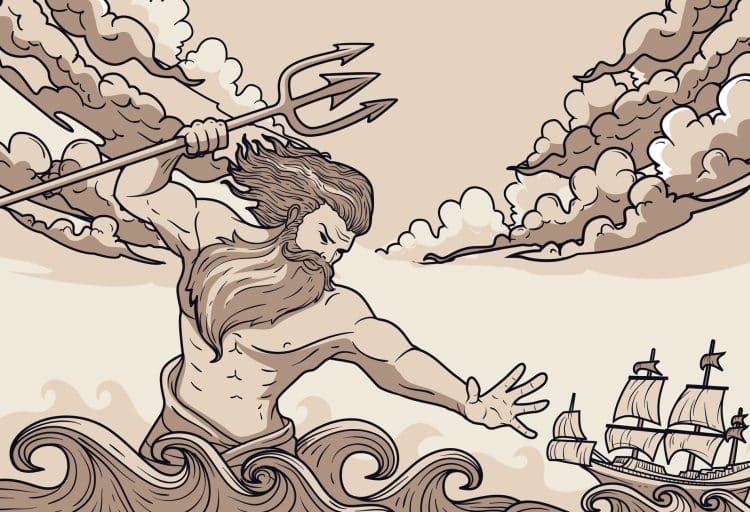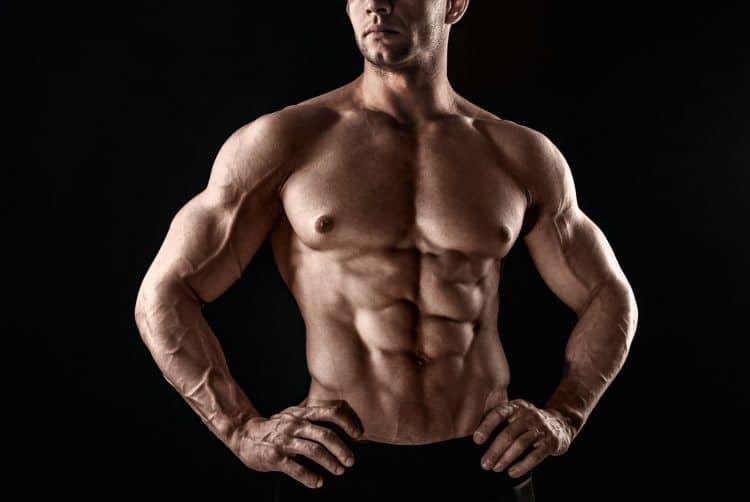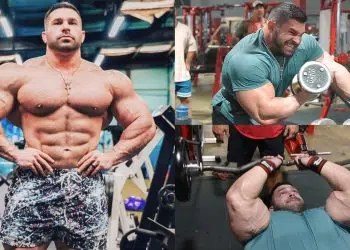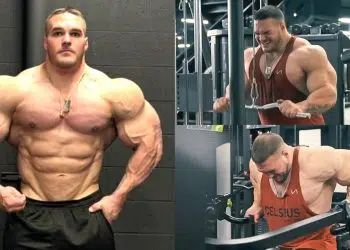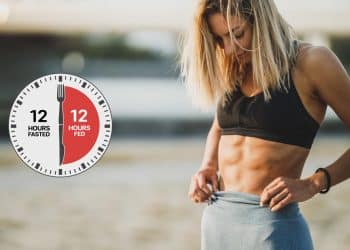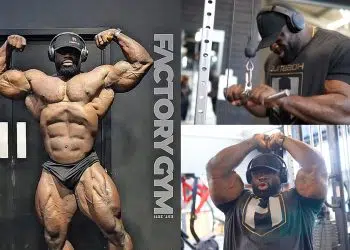Steve Reeves in Hercules (1958), Brad Pitt in Troy (2004), and Gerald Butler in 300 (2006) all had one thing in common—a shredded physique the Greek gods would approve of.
It is no secret the Greeks had their sports figured out. The fact that marquee sporting events like the Olympics and the Superbowl of bodybuilding—the Olympia—are named after a peninsula in southern Greece is a testament to their sporting and athletic prowess.
Greek gods have a big influence on the sport of bodybuilding. And no, we aren’t talking about an epiphany or an oracle’s prediction here. Eugen Sandow, also known as The Father of Modern Bodybuilding, visited local museums with a measuring tape in his back pocket and measured the sculptures of Greek gods to assess their physical proportions.
The five-foot-nine inch tall bodybuilder had the following measurements:
- Biceps: 18 inches
- Calves: 18 inches
- Chest: 48 inches
- Waist: 30 inches
- Upper leg: 27 inches
Trivia: The Mr. Olympia trophy is named after Eugen Sandow.
Greek Gods’ bodies are a work of art. They have the right amount of muscle mass, definition, symmetry, and functionality. The last is usually missing from some Hollywood transformation programs that focus solely on aesthetics. However, you don’t expect the same from a demi-god. Atlas popping his lower back while lifting the weight of the heavens (represented by a stone) on his shoulders would be awkward, after all.
Level Up Your Fitness: Join our 💪 strong community in Fitness Volt Newsletter. Get daily inspiration, expert-backed workouts, nutrition tips, the latest in strength sports, and the support you need to reach your goals. Subscribe for free!
An individual with washboard abs, a perfectly crafted V-taper, and diced conditioning is labeled as having a Greek God physique. However, achieving the feat is easier said than done.
Next Read: How to Build a V-Taper – Training Guide and Nutrition Tips
How To Build a Greek God Body
Your Greek god body transformation journey will depend on your current fitness level and body composition. Body composition is important as Greek gods have balanced and symmetrical physiques (as portrayed by their statues). If you are six-foot-one and have big legs but a small back, your program will vary from that of a five-foot-eight-inch guy with a decent lower body and back.
Sounds confusing? Don’t worry. We have got you covered. Here are the steps you need to follow to look like a Greek god:
1. Shed Body Fat
Remember that Greek god with the bulging waistline and the double chin? Yep, we neither.
Zeus, Poseidon, Ares, Apollo, etcetera had perfectly chiseled abdomen and muscular pecs, backs, shoulders, arms, and lower bodies. We would tell you about their sharp jawlines if it wasn’t for their dense, curly beards.
While you don’t need to be peeled to the bone to look like a Greek god, you should aim to be in the 8-10 percent body fat range.
Not sure how to measure your body fat percentage? Check out our nifty body fat calculator to get all your questions answered.
2. Build Muscle Mass
No surprises here. You’ll need to put on muscle mass to tone your physique and improve your aesthetics. On the other hand, you need to ensure you do not turn into a blob of meat. You need to maintain your functionality while adding size.
Plus, if things weren’t complicated enough, you need to monitor your body’s proportions and ensure you have no lagging muscle groups. The importance of symmetry and balance was best explained by Arnold when he said:
“When I went to train with my hero, Reg Park, he pulled out a tape measure and measured my calves and biceps. He said, ‘Arnold, your calves are 19 inches, and your biceps are 21 inches. You might win Mr. Universe like this, but you’ll never go all the way. You need to build up your calves. Every step you take is a 250-pound calf raise. So to grow, you are going to have to go as heavy as possible, and you’re going to need to do 10-15 sets every single day.'”
However, you do not need to go all Mr. Olympia to qualify for a Greek god body. In fact, it might sound blasphemous, but most IFBB Pro League Open division competitors do not have Greek god aesthetics anymore.
Related: Weight Gain Calculator
a. Engrain the Golden Ratio into Your Physique
The golden ratio is the irrational number (1 + Square root of√5)/2, often denoted by the Greek letter ϕ or τ, and is approximately equal to 1.618. Although irrational, the Greeks had observed the golden ratio provided the most aesthetically pleasing proportion of sides of a rectangle.
Furthermore, the golden ratio is believed to govern natural laws such as the shape and proportion of the human body and even the growth pattern of plants.
We know what you’re wondering—all this blabber about the golden ratio is okay, but how does it translate to building a Greek god body?
For a lean man to achieve the golden ratio, his shoulder width should be 1.6 times his waist size. Although this might sound rudimentary, this will be your first step toward building a V-taper.
Also, it doesn’t end here. Getting your shoulders 1.6 times your waist size will only get you so far on your quest to build a Greek god body. As Arnie said earlier, you should improve your body proportions to have a flowing physique.
b. Enter the Grecian Ideal
Staying true to his moniker, “The Father of Modern Bodybuilding,” Sandow gave us the Grecian ideal.
Level Up Your Fitness: Join our 💪 strong community in Fitness Volt Newsletter. Get daily inspiration, expert-backed workouts, nutrition tips, the latest in strength sports, and the support you need to reach your goals. Subscribe for free!
Per the ideal, for a man to build a perfectly proportionate physique his:
- Your shoulders should be 1.6 times your waist (golden ratio)
- Flexed biceps should measure 2.5 times your non-dominant wrist
- Your chest should be 6.5 times your dominant wrist
- Flexed calves should be the same size as your flexed biceps
- The upper leg should be 1.75 times bigger than your knee
Does this sound too overwhelming? Use our free Grecian Ideal calculator to check how you stack up against the ideal Greek God body proportions.
3. Recomposition
Now, every person that wants a Greek god body won’t be starting from scratch. If you already have the foundation and a solid structure, you might need to rejig some things.
People in the 15-20 body fat percentage range will want to bump up their cardio activity and reduce their calorie intake to enter a calorie deficit. A calorie deficit is when you expend more calories than you eat in a day.
On the other hand, if you are underweight and want to put on size, you should follow a calorie surplus diet, meaning eating more calories than you spend in a day.
How do I know if I’m underweight, you ask?
Although not foolproof, Body Mass Index (BMI) is one the best ways of determining if you need to gain, shed, or maintain body weight. BMI compares your weight to your height to determine if you are over, under, or the right weight for your height.
Here are what the BMI readings indicate:
- Underweight = 18.5 or less
- Normal weight = 18.5 – 24.9
- Overweight = 25 – 29.9
- Obese = 30 or more
Check out our BMI calculator to learn if you are at healthy body weight.
4. Program Recovery
It does not matter how hard you train or how many calories you eat (or do not eat) in a day, you will never see the needle budge in the right direction until you give your body enough time to recuperate from your workouts.
To build muscle mass and shed the spare tire, you need at least seven to eight hours of sleep every night. Furthermore, feel free to hit a massage parlor for some deep tissue work to speed up your recovery process.
Must Read: 8 Ways to Speed Up Recovery After Training
Greek God Body Workout Program
Building a physique that would give you a chance against Hercules is no joke. You will train at least five days a week on the Greek god body transformation program. Of the two rest days, one will be an active rest day where you need to do at least 30 minutes of low-intensity cardio. The second will be an optional rest day, where you have the option to become a couch potato, but obviously, it is not recommended.
Here is what the Greek god body workout split will look like:
- Monday: Legs
- Tuesday: Arms and Abs
- Wednesday: Chest
- Thursday: Active Rest
- Friday: Back
- Saturday: Shoulders and Abs
- Sunday: Rest
Monday: Legs
| Exercise | Sets | Reps |
| Squat | 4 sets | 12-15 reps |
| Walking Lunge | 3 sets | 12-15 reps |
| Leg Extension | 3 sets | 12-15 reps |
| Romanian Deadlift | 4 sets | 12-15 reps |
| Leg Curl | 3 sets | 12-15 reps |
| Leg Press | 4 sets | 12-15 reps |
| Standing Calf Raise | 5 sets | 12-15 reps |
| Calf Press on Leg Press Machine | 5 sets | 12-15 reps |
Tuesday: Arms and Abs
| Exercise | Sets | Reps |
| Barbell Curl | 4 sets | 12-15 reps |
| Cable Curl | 3 sets | 12-15 reps |
| 21s | 3 sets | 12-15 reps |
| Concentration Curl | 3 sets | 12-15 reps |
| Triceps Rope Pushdown | 4 sets | 12-15 reps |
| Overhead Triceps Extension | 3 sets | 12-15 reps |
| Dumbbell Kickback | 3 sets | 12-15 reps |
| EZ-Bar Skull Crusher | 3 sets | 12-15 reps |
| Hanging Leg Raise | 5 sets | 12-15 reps |
| Russian Twist | 5 sets | 12-15 reps |
Wednesday: Chest
| Exercise | Sets | Reps |
| Barbell Bench Press | 4 sets | 12-15 reps |
| Dumbbell Fly | 3 sets | 12-15 reps |
| Smith Machine Incline Press | 3 sets | 12-15 reps |
| Decline Dumbbell Fly | 3 sets | 12-15 reps |
| Pec Deck Fly | 4 sets | 12-15 reps |
Thursday: Active Rest
- 30 minutes of low-intensity cardio like swimming, jogging, dancing, etc.
Friday: Back
| Exercise | Sets | Reps |
| Deadlift | 4 sets | 4-10 reps |
| Wide-Grip Lat Pull-down | 3 sets | 12-15 reps |
| Bent-Over Barbell Row | 3 sets | 12-15 reps |
| Cable Straight-Arm Lat Pull-Down | 3 sets | 12-15 reps |
| Single-Arm Dumbbell Row | 3 sets | 12-15 reps |
| GHD | 3 sets | 12-15 reps |
Saturday: Shoulders and Abs
| Exercise | Sets | Reps |
| Military Press | 4 sets | 12-15 reps |
| Arnold Press | 3 sets | 12-15 reps |
| Dumbbell Side Lateral Raise | 3 sets | 12-15 reps |
| Dumbbell Front Raise | 3 sets | 12-15 reps |
| Reverse Pec Deck Fly | 3 sets | 12-15 reps |
| Barbell Shrug | 4 sets | 12-15 reps |
| Reverse Crunch | 5 sets | 12-15 reps |
| Crunch | 5 sets | 12-15 reps |
| Plank | 3 sets | 1 minute each |
Sunday: Rest
- 30-minute cardio session optional
More Workout Plans:
- PHAT Workout Plan
- Jay Cutler Workout
- Dorian Yates Workout
- Chris Bumstead Workout Program
- Dexter Jackson Workout Program
- Mike O’Hearn Workout Program
- Calum Von Moger Workout Program
- Slim Waist Workout
- Powerbuilding Workout Plan
- Pull Day Workouts
Greek God Body Diet Program

Diet is one of the things that is often overlooked in a Greek God transformation program. And it makes sense not to talk about it. No one expects Zeus to sit down six times a day to eat chicken breast, broccoli, and rice.
Nonetheless, you can never build a Greek God physique on a hamburger diet, irrespective of how hard you train or how many gladiators you put to rest inside the Colosseum.
Have you ever gone to one of these Greek restaurants? Their menu is packed with nutrition-dense whole foods. Most dishes have a high-protein source, veggies, and a complex carb on the side. Eat there a few times a week, and you’ve experienced firsthand why these folks are in great shape.
The first step in designing your diet program should be to find your Total Daily Energy Expenditure (TDEE). You should then break down the total calories into macronutrient goals to speed up your transformation progress.
The Greek God Diet Plan
While you might find diets for building a Greek god physique on the internet, the truth is, most will not work for you. Don’t get us wrong. We don’t mean there is something wrong with you.
For a diet to be effective, it needs to be customized as per your current body weight, body fat percentage, and lifestyle. Hence, following a random diet pulled from the internet will not work for you.
If you cannot design a diet program for yourself, seeking help from a professional with a proven track record can save you time, money, and effort.
Things to consider while designing your diet plan:
- Do not make drastic changes to your diet from day one. Ease into your new diet instead of jumping into it.
- Per experts, 3,500 calories make up a pound of body fat. According to this, you should cut 500 calories from your diet a day to lose one pound a week. On the other hand, adding 500 calories will lead to a gain of one pound per week. [1]
- If your goal is to add muscle mass, you should be eating between 1.8 to 2.2 grams of protein per pound of body weight.
- 30% of your calories should come from fats.
- Carbohydrates should make up the remaining calories.
Check Out: 10 Best Bulking Breakfast Ideas For Gaining Muscle Size and Strength
Wrapping Up
While you shouldn’t expect to kill the Nemean lion after following the Greek god body workout and diet plan for twelve weeks, you will be well on your way to looking like a perfectly crafter Greek god sculpture by the end of the training tenure.
Remember, while following the Greek god body workout and diet program, you should be on your toes. Constantly monitor your progress and make changes when you think things aren’t going your way. Best of luck!
References
- Webb, Densie, PhD, RD. Farewell to the 3,500-Calorie Rule Today’s Dietitian Vol. 26 No. 11 P. 36. November 2014

